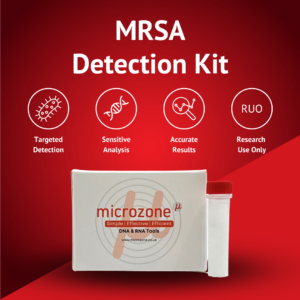Your basket is currently empty!
Products
-
 MRSA Detection Kit£900.00
MRSA Detection Kit£900.00

Application
Methicillin-resistant Staphylococcus aureus (MRSA) detection is essential in clinical and healthcare settings to manage infections and prevent outbreaks. Various diagnostic methods are available, each with unique advantages depending on the requirements for speed, sensitivity, and resource availability.
Traditional Culture Methods
Culture-based methods remain a standard for MRSA detection due to their reliability and ability to confirm viable bacteria. These methods typically involve growing the organism on selective media, followed by confirmatory testing for methicillin resistance. While highly specific, culture methods are time-consuming, requiring 24-48 hours to yield results, and may delay critical clinical decisions.
Molecular Detection Methods
Molecular methods, particularly real-time PCR, have revolutionized MRSA detection by offering rapid and highly accurate identification of MRSA-specific genetic markers. These techniques provide results in hours rather than days, enabling timely intervention and supporting infection control measures.
Microzone’s MRSA qPCR Assay is a reliable option for molecular detection, featuring:
The assay is compatible with a wide range of real-time PCR platforms and provides robust, reproducible results for effective MRSA monitoring and control.
Applications of MRSA Detection Methods
Choosing the Right Method
Culture-based methods are valuable for definitive detection of viable MRSA and antibiotic resistance profiling, whereas molecular techniques like Microzone’s MRSA qPCR Assay excel in situations requiring speed, accuracy, and the ability to screen large numbers of samples efficiently.
By leveraging the strengths of both approaches, healthcare providers can ensure accurate MRSA detection and effective infection control strategies.
